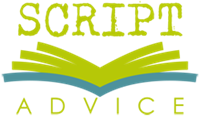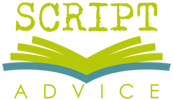I asked Jayne Lake; writer, twitterer, facebook member of my group Script Advice Writer’s Room and all round good egg, to pen me a blog about what she took from the BBC Writers’ Festival 2014. Here it is….
The fifth BBC TV Drama Writers’ Festival came to Central Saint Martins College of Art and Design, a one-time Victorian wheat store transformed into uber-cool lecture rooms and rubber clad studios for arty types, it’s industrial strength air con much needed – by me.
Kate Rowland and her team sprinkled fairy dust over the unrivalled schedule, I made a point of selecting all the available sessions about ‘women on the box’. Apart from the short notice withdrawal of doyenne Sally Wainwright, this year’s strong female line-up would not disappoint.
Keynote If Content is King, Where’s our Crown? – Like an entertaining fruit and veg wholesaler Tony Jordan outlined established and newly forming markets for drama output and gave us his rally call to feed the ever-hungry story beast. A community of writers drawn together to listen, learn, share and contribute, we are all connected, he tells us ‘[by] story struggling to tear itself from our souls’. Feeling a smidgeon taller, I floated off to my first sesh, my life’s goal to: ‘create something extraordinary’ tucked under my heavy-duty bra strap. Can-do-will-do-stuff indeed.
Developing Your Character – Writer Danny Brocklehurst discussed his writing process behind Exile and disgraced journo Tom Ronstadt (John Simm) – a character who returns to his backwater hometown to discover his once brutal father in the grip of Alzheimer’s. It’s the way his character relates in any given moment that hooks his audience Danny argues. There is a mystery to solve – why did a once beloved father violently banish his son? But whilst plot is crucial, for Danny character always lies at the starting block and at the heart. In Barbara Machin’s long-runner Waking the Dead the emphasis shifts. Character is the ‘elephant in the room’, what’s not said speaking volumes about protagonists the audience comes to love over time. Her characters develop in ‘slow burn… [they] occupy a deeper emotional place… [big] event moments allow new and exciting chinks in character’. Danny talked about writing self-indulgent ‘physical’ directions in the first draft to inform himself as much as anything else. Subsequent drafts stripped back to allow the actors and director to do the work. Someone asked Danny and Barbara to name memorable leading female characters in British drama. Time was up, a session for next year, or the year after, perhaps.
Women in TV: Unfinished Business – Head of Drama Scotland Chris Aird chaired a superb discussion on women in TV. Pier Wilkie and China Moo Young (Director/Producer-Director) and Sally Abbott (Writer) talked about working at the BBC and in the independent sector, giving anecdotes about obstructive others and critical selves. Sally described her early battles with self-confidence until a cathartic light bulb moment freed her from a creative cul-de-sac. Although her juggle with deadlines, kids and a rescue dog is not easy, she knows the value of her own voice now and rightly excels in it with the support of her family.
Pier Wilkie talked about the huge financial pressures on drama production. When she’s looking to hire the stakes are enormous, she needs ‘experience’ first. Conversely women can’t get experience as writers, producers and directors unless someone is prepared to take a financial (and I might argue here) conscious punt on an unknown quantity. There was a rumbling anxiety in the room – won’t moaning about inequality alienate the powers that be? To be valued in the industry, women need ‘an assured and calm and measured’ outlook – nothing divaesque!
Do women only write ‘domestic’ or are there any opportunities in genre? A mixed response from the panel but isn’t domestic writing just screaming babies, preeclampsia, dirty nappies? Is it that little show with nine million viewers Call The Midwife or maybe it’s Pier’s much acclaimed BBC 3 Murdered By My Boyfriend – both dramas depicting the stuff of life and death and everything in between. More next year on what women write/want to write. Maybe.
Do We Need Treatments? – A blessed rest from all this angsty feminist malarchy! Bryan Elsley’s entertaining take on the writer’s roadmap, he argues we need treatments to encapsulate the semi-coherent ‘idea’. The first draft treatment is the ‘what if’ document, the blueprint created by the ‘organized magician’ within. This is the place where Bryan feels most confident but for the production company the fully worked version is the solid thing that says this is ‘our property’, our development ‘asset’. Bryan’s advice is that the exec wants pure story. Some shot based treatments work well but may be too directorial? The exec’s bus or tube ride is a finite thing so as a guide; fit your story into his/her journey to work. A narrative based approach enables a quick read. For series treatments each ep should imply a defining event best embedded in its title. Set out the arc, the movements and connections between the episodes. Name characters with a brief description and how they relate to one another. Write the ‘out’, or in other words: Why you are the writer for this project and where your work sits in the market. Clarify the thing that is worth the money creatively and spiritually, then reduce the entire document by 10%! Don’t reference other shows – your story is ‘unique’. Be illusive. Tonal. Box clever.
Keynote The Two Tones – Tony J in relaxed conversation with Director General Tony Hall who affirmed his commitment to creativity, diversity and risk taking across drama at the BBC. Did you know that, despite his previous gig at The Royal Opera House, Tony Hall’s a real man of the people now he’s binge watched Happy Valley? Yay! The ‘Two Tone’s’ conversation flowed, Liverpudlian roots and regenerated accents made them blood brothers right? Tony J slipped comfortably back into expletive heavy. Tony H didn’t seem to mind and I felt assured this effusive, passionate bloke liked what we do and he wouldn’t let us down.
How I write – Sarah Phelps’s research task for BBC 1 six-parter The Crimson Field was gargantuan, not least because much of what we think we know about The Great War is so misshapen by the ‘heroic lies’ of history, mediated accounts of the men and women on the Western Front. Sarah’s main resource came in the form of Lyn MacDonald’s The Roses of No Man’s Land, a contemporary account of the women who volunteered to serve in the medical tents not a stones throw away from the trenches. So much material was handed over to Sarah that she was oftentimes overwhelmed, she made hard decisions about what to read and what to include whilst still staying true to her raw writers voice and trying to keep her sanity! For an hour Sarah had us spellbound as she recounted anecdote after anecdote about these brave women and men’s lives, many of whom found themselves transported from their genteel Edwardian British society into the bloody heart of the first world war. Off by heart, Sarah concluded her talk with Thomas Hardy’s 1916 poem In Time of ‘The Breaking of Nations’. Beyond moving.
Face to Face with Abi Morgan – I wanted to know every juicy detail, who, after all, wouldn’t want her life? Abi left university and got work imputing data about the building she worked in. Aside from the computer, she was entirely on her own in this empty office block; her employers didn’t seem to care what she did or how long she took to do the job. She wrote her first screenplay and didn’t input data. She got paid. For FIVE YEARS. It was great, she achieved tons. She was horrendously lonely. Today Abi has a partner and two children. When the children were small she worked from home but they’re older now, more distracting. Abi is currently working in an office at Kudos. Undisturbed. Abi’s working day is from 9 – 7. Sometimes this is filled to busting writing and sometimes she gets distracted by Solitaire Blitz. Yes! Yes! Yes!
Abi writes what she finds ‘profoundly moving’ and advises writers to ask of themselves always: ‘what is this story about?…[And] give something of yourself’. Have an outline, keep poetics minimal, tone is paramount. Abi doesn’t read back her early drafts she just clicks ‘send’! An audible incredulity (on my part covetous!) spread amongst the audience, this writer obviously is self-aware, majorly confident (not arrogant, I did not find her so) and brave. In the Q&A someone asked what work she was most proud of writing? And I was knocked sideways by her response…. introspective for a moment: ‘pride is something I find hard to associate with what I do’. What!? With such an influential body of work behind and undoubtedly in front of her how on earth can this possibly be? I may have misunderstood my heroine here but why the hell shouldn’t she be proud of what she’s achieved? It seems that women writers, even at the very pinnacle of the industry recoil from publicly blowing their own trumpet. Love her.
Keynote Unstoryfiable – Documentary filmmaker Adam Curtis believes story is in mortal decline, news on a continuous loop, nothing resolves. Google, Facebook, Twitter and Cisco reducing everything to a manipulated, homogenous stream, the worlds financial markets unelected and unchecked. Curtis calls this the ‘algorithm loop of news, power, money, media and [subsequently] STORY’. I understood in principle where this guy was coming from, I felt for him – for us, but rather than be gloomy I should go do something about this heinous state of affairs shouldn’t I? I mean I should write something… write something really ‘extraordinary’.
Adjusts bra strap. Clicks send.
Thank you Jayne for sharing your experience of the Festival with the Script Advice readership.
Contact me: www.scriptadvice.co.uk for help with your television writing and buy my book on the subject https://www.amazon.co.uk/Writing-Television-Yvonne-Grace/dp/1843443376/ref=sr_1_7?s=books&ie=UTF8&qid=1400840643&sr=1-7&keywords=writing+for+television




